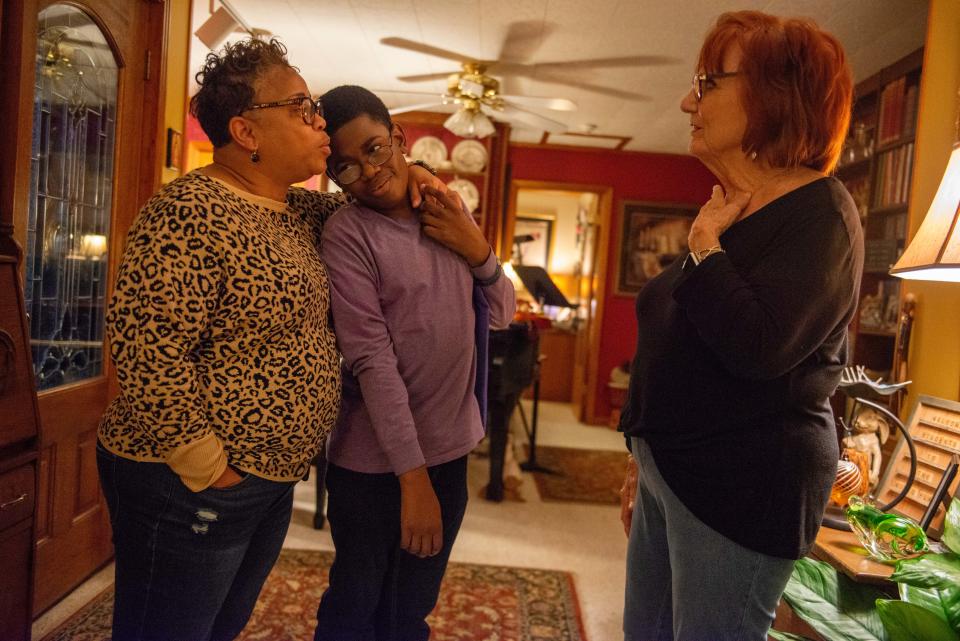'Just listen': Why disability advocates are warily eyeing federal education funding debate

When Kim Boyd heard Tennessee might give up billions in federal education funding, her first reaction was panic.
She knew the public education her son Ty receives largely rests on federal disability law, which established a right to a free and “appropriate” education in 1975, at a time when the vast majority of children with disabilities were educated in institutions.
“My first thought was how would this affect my child?” Boyd asked. “How would this affect other children? How would this affect those school-aged children that depend on the schools, on the public education system?”
Parents and advocates are now asking state lawmakers to carefully consider and listen to the disability community when a legislative working group begins meeting next month to determine whether the state can reject the funding and recommend a strategy for how to do so before the January legislative session.
The proposal to give up those dollars concerns parents like Boyd, raising a growing teenager in need of specialized nursing care in school, and has baffled disability advocates in the state, who see little upside in rejecting a pot of money Tennessee taxpayers will continue paying for through their tax dollars.
Whatever the working group’s recommendation, the question of foregoing federal education money is a complicated one. The federal “overreach” now chafing Republican lawmakers, as Gov. Bill Lee called it in September, is tied up in multiple cash streams underwritten by myriad federal laws.
Tennessee received more than $10.4 billion in federal education funding between 2019 through 2023, per a Department of Education report prepared in February at the request of House Speaker Cameron Sexton, R-Crossville.
The federal oversight tied to some of those funds, characterized as overreach by some state Republicans, is seen as protection by disability advocates.
Landmark federal protections for students with disabilities are interwoven into that funding web, leaving disability advocates and families fearful of losing accountability measures that protect their children’s right to an equitable public education alongside their peers.
More than $1.7 billion of that pot was specifically designated through the Individuals with Disabilities Education Act, or IDEA, which protects the education rights of the more than 135,000 Tennessee children attending public schools with some form of a disability, per 2021 data.
“It feels like an abyss when you think about billions being in play here,” said Sarah Cripps, a Tennessee lawyer and advocate who was born blind. “What does it look like on the other side of rejection? I don’t know the answer, but it’s frightening to me, personally, for such vulnerable populations.”
The role of IDEA
Cripps was born in Dekalb County in 1972, just three years before Congress passed IDEA's predecessor law, which guaranteed access to a free and appropriate education, with reasonable accommodations ensured for students with disabilities.
At the time, the majority of Tennessee children who were blind were educated in a state institution. Overall, just 1 in 5 Tennessee children with disabilities received mainstream educations.

"It makes for grim reading to go back and see what education was like in this country prior to 1975," Cripps said. "It’s a pretty bleak picture. That was a time when students who learned differently were segregated, largely to their detriment."
Cripps was an outlier, the first blind Tennessee student to matriculate from kindergarten through 12th grade in public schools, aided by accommodations and technology undergirded by federal protections. She competed in school extracurriculars like the rodeo, even placing in a state goat-tying competition, before going on to Vanderbilt University Law School.
She couldn't have accessed those opportunities without a mainstream education, Cripps said.
“You can’t place a pricetag on that," Cripps said.
Advocates trade in hypotheticals, for now, on what ripple effects foregoing federal funds would have on the state. No other state has attempted to do so.
Jeff Strand, the Tennessee Disability Coalition’s government affairs coordinator, said the state could replicate parts of federal law to ensure similar disability protections continue. State code already includes certain tenets of IDEA, such as the right to a ""free "appropriate" education and individualized education plans.
But by giving up federal IDEA funding, the state could lose independent oversight of the accommodations for those with disabilities, and there doesn't appear to be state code guaranteeing parental and teacher participation like IDEA does.
Through IDEA funds, the Office of Special Education Programs monitors and holds states accountable to federal disability education requirements. In fact, Tennessee is scheduled for a routine monitoring round slated to begin in March and run through 2026.
“The important thing that folks might be missing is the vital importance of oversight and due process avenues for redress,” Strand said. “It’s important there are multiple, independent eyes looking at how we are providing these services."
If Tennessee turns down federal funds, who picks up the tab?
Sexton has said Tennessee can “pick up the cost” if it turns down some or all federal education funding streams, a suggestion House Democratic Caucus Chair John Ray Clemmons, D-Nashville, called “irresponsible.”
For Boyd, the suggestion is puzzling. If the state has billions in excess money to inject into the education system, she asks, “why are we not currently using that?"
Karen Harrison said there are already “challenges” in education for those with disabilities, and education in general, in Tennessee, including in hiring and retaining teachers.
“If there are excess funds available, why are those not put towards meeting the needs for the gaps in services right now that are impacting students negatively?” said Harrison, executive director of TN STEP, an East Tennessee-based advocacy organization that teaches families about their rights under disability law.
The questions mirror what Lauren Pearcy is hearing from the disability community.
Pearcy, the executive director of the Tennessee Council on Development Disabilities, said she would characterize the reaction to the proposal as “perplexed.”

“We’re really struggling to understand the benefit of giving up the protections and funding that come with the taxes we pay, and the laws we still have to follow,” Pearcy said. “For the disability community, our lens is this is protection. This is very difficult for us to wrap our head around for what the benefit could possibly be."
As lawmakers begin to meet next month, Boyd implores them to "listen, just listen" to families like hers, raising kids with different abilities but many of the same hopes and dreams as any Tennessee child.
"Think about if it was your child, your family members — any of us could become disabled or differently abled at any time," Boyd said. "Things could change. I would like for people for those on both sides to stop and think what parents, caregivers and school educators are dealing with, so they can have the funding they need to provide an appropriate education for our children. Give them the resources that they need."
Federal Education Funding Working Group
∎ Monday, Nov. 6 at 2 p.m.
∎ Tuesday, Nov. 7 from 9 a.m. to 11 a.m. and 1 p.m. to 3 p.m.
∎ Wednesday, Nov. 8 from 9 a.m. to 11 a.m.
∎ Tuesday, Nov. 14 from 9 a.m. to 11 a.m.
∎ Wednesday, Nov. 15 from 9 a.m. to 11 a.m. and 1 p.m. to 3 p.m.
All meetings are scheduled to take place at the Senate Hearing Room in the Cordell Hull State Office Building located at 425 Rep. John Lewis Way N in Nashville.
This article originally appeared on Nashville Tennessean: TN education: Disability advocates warily eye federal funding debate

